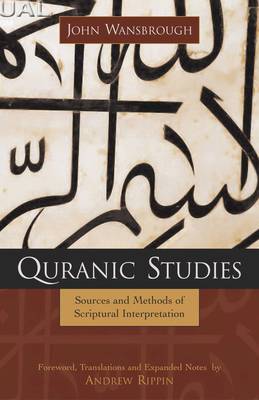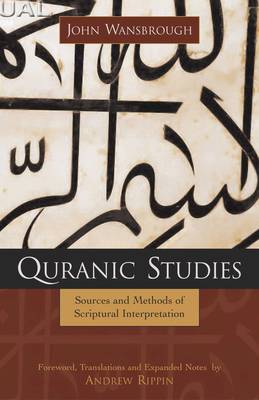
- Afhalen na 1 uur in een winkel met voorraad
- Gratis thuislevering in België vanaf € 30
- Ruim aanbod met 7 miljoen producten
- Afhalen na 1 uur in een winkel met voorraad
- Gratis thuislevering in België vanaf € 30
- Ruim aanbod met 7 miljoen producten
Zoeken
€ 57,95
+ 115 punten
Omschrijving
One of the most innovative thinkers in the field of Islamic Studies was John Wansbrough (1928-2002), Professor of Semitic Studies and Pro-Director of London University's School of Oriental and African Studies. Critiquing the traditional accounts of the origins of Islam as historically unreliable and heavily influenced by religious dogma, Wansbrough suggested radically new interpretations very different from the views of both the Muslim orthodoxy and most Western scholars.Originally published in 1977, Quranic Studies presents an in-depth textual exegesis of the Quran based on form analysis. Noting the persistent use of monotheistic imagery stemming from Judeo-Christian sources, he interpreted the rise of Islam as the development of what was originally a Judeo-Christian sect. As this sect evolved and differentiated itself from its Judeo-Christian roots, the Quran also evolved and was continuously in flux for over a century. Wansbrough concluded that the canonization of the text that we today call the Quran, and even the emergence of the concept of "Islam," probably did not occur till the end of the eighth century, more than 150 years after the death of Muhammad.Although his work remains controversial to this day, his fresh insights and approaches to the study of Islam continue to inspire scholars. This new edition contains a valuable assessment of Wansbrough's contributions and many useful textual notes and translations by Andrew Rippin (professor of history, University of Victoria).
Specificaties
Betrokkenen
- Auteur(s):
- Vertaler(s):
- Uitgeverij:
Inhoud
- Aantal bladzijden:
- 320
- Taal:
- Engels
Eigenschappen
- Productcode (EAN):
- 9781591022015
- Verschijningsdatum:
- 31/08/2004
- Uitvoering:
- Hardcover
- Formaat:
- Genaaid
- Afmetingen:
- 142 mm x 208 mm
- Gewicht:
- 498 g

Alleen bij Standaard Boekhandel
+ 115 punten op je klantenkaart van Standaard Boekhandel
Beoordelingen
We publiceren alleen reviews die voldoen aan de voorwaarden voor reviews. Bekijk onze voorwaarden voor reviews.








